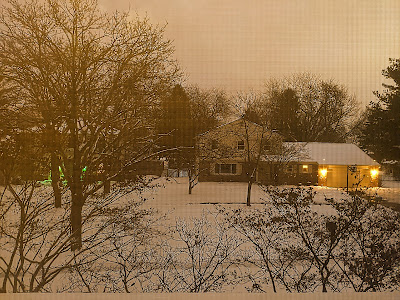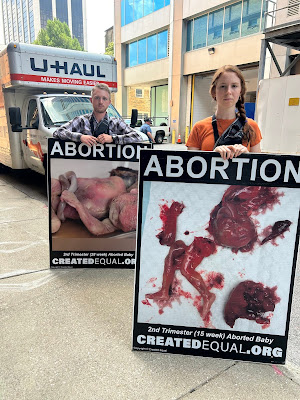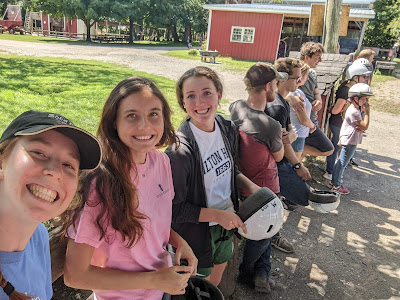Justice Ride Conversations, Part 4: Aza
Of all the conversations I had during the Justice Ride, one sticks out the most. It was with a student at the University of Central Florida. He said I could call him Aza. He was very sweet and genuine, and, while he didn't definitely change his mind there in that conversation, he seemed to really be thinking about it. I have hope that he may someday come to a fuller understanding of the wickedness of abortion in all cases.
 |
| One of the Justice Riders, Ella, helped in this conversation with Aza! |
“What do you think about abortion?” I asked a student walking by, who later gave me his name, Aza.
“I don’t have any opinion,” he replied, and then opened the brochure and looked at it for a moment before adding, “I’m okay with it for another person.”
I asked him why and he answered, “I guess, if she doesn’t want a baby, then abortion is gonna help her.”
“What do you think abortion does?”
“No idea.”
“It kills a baby.”
“Yeah I know.”
“So, what do you think is different about the preborn child versus the born child?”
He looked around, shrugged his shoulders, and said, “No idea. I just…if she doesn’t really want a baby, then she is likely to do abortion.”
“Mm hmm, yeah, she may be likely, it’s very common, sadly, today, but the thing is that preborn children are fully human, just as we are, so it’s just as wrong to kill them.”
“Yeah, you think it is murder.”
“Yes, yeah, we would agree with that. You’ve heard that before from pro-life people?”
“Yeah.”
“So what do you think of that?”
He looked at the brochure again, then thought for a moment before saying, as he looked at the sign, “I don’t think that this is murder…” He thought for another moment and said, “But for a personal being, I think that’s one option.” He paused, and then, “That’s what I think.”
I probed, “Do you think that they’re human beings, or do you think they’re like, something else?”
“No idea. I mean, I think they’re not…babies, you know. I’m just honest.”
“Yeah, yeah, and I want your honest thoughts. So like, when do you think that they become human?”
“When they – after the birth.”
“Okay. So, what changes from when they’re inside their mother to when they exit their mother? What changes about that specific child?”
He paused, and smiled, “I never asked that question. That’s a really deep one. I guess, I don’t know when consciousness is uh - when people become conscious. I don’t know when.”
“Yeah, so that probably can vary a little bit. Do you think that consciousness is what gives us our value as human beings and what makes it wrong to kill one of us?”
“I think, um, to kill someone is morally wrong. But we are animals. You know what I mean? I mean, like, we value ourselves like we are beyond animals, but I think we are just animals. I don’t think that we are beyond animals.”
“Yeah. I mean, we’re creatures. God created us, and animals. Do you think that there’s - like obviously, most humans see a difference between humans and animals - do you think there’s actually a difference, morally?”
“Well, see, no, because I’m an atheist, I became one, and I don’t think that God created us, and I don’t think that there is absolute value, moral value, you know, good and bad. I think they’re relative.”
“Okay. So, would you say it is – well, you just said, you don’t believe in any absolute right or wrong. So, what if I all of a sudden pulled a gun, what if I shot you? Would you say that’s wrong? Or would you just say it’s – I don’t know – would you say it’s wrong?”
“Um, I don’t think that’s wrong.”
“You don’t think so?”
“I mean, uh, a desire to kill someone is definitely wrong. But, I mean, wrong with – it means that someone who desires to kill has some, uh, bad – not bad - mm, weak, emotions. Weak emotions give birth to such type of desires.”
“Yeah. If there’s no absolute right or wrong though, how can you even say that any emotions can be weak or bad, or anything like that?”
“Um, so, if there’s no absolute values, then I have to define my values by myself, right? And, after deciding these values, I can say that these values are my morality now. So I would judge by this morality. Not the socially accepted morality I guess – yeah. I think that’s right.”
“So if someone has a desire to kill someone else, like you said, you’re saying that would be bad, but that’s from your point of view; but from their point of view, it might not be. So, it just depends on the person, or - ?”
“Well, socially, it is bad; it will hurt society. If you want a good society, then these desires are considered as bad. So, I would say, I do not belong to this morality, the social accepted morality, but I think that this is socially polite to be, to act as one who is –“
He was struggling to find the word, so I interjected, “kind? To act kind to people and not want to kill people?”
He affirmed that’s what he was getting at, and he said, “I haven’t gotten to discuss this with anyone.”
“I’m glad we’re getting the opportunity to talk about this, because it’s very important.”
He then opened up the brochure and asked what it’s for. I answered that, “We’re trying to show the truth of abortion, because abortion kills over 2,300 children every day in America, and so many people don’t even realize the gravity of it, and it kills an actual human being. Or even if they say it kills an actual human being, they might say it doesn’t matter, it just doesn’t matter. But, so many are surprised at what the children look like when they’re killed, they don’t know how violent abortion is, so yeah, basically we’re out here educating people, in hopes of changing peoples’ minds on abortion, because honestly this is the greatest evil of our day, because if they’re human beings just like we are, then it’s just as wrong to kill them as it is us. ‘Cause our value doesn’t change depending on where we are or our level of development. ‘Cause like, you and I, we vary, even, I’m guessing we’re not the exact same age, so like, we may be at different levels of development, but it would be just as wrong to kill one of us as the other one, right? So it’s the same with the preborn; they’re less developed, but they’re just as developed as they should be at their stage of life.”
“That’s an argument.”
“Yeah, so that’s why we’re out here, trying to change people’s minds on abortion, and save lives that way, if that makes sense. Do you have any other thoughts about it?”
He looked at the open brochure some more, and then I explained how you don’t even have to be a Christian to be against abortion, just on the basis of human rights, and shared about how we’re different because we’re made in God’s image and I shared the gospel with him, and then he shared that he was a Muslim before becoming an atheist. I explained that if there’s no absolute truth, then that only leads to chaos, to which he replied, “I agree.”
He told me about how he came to believe the way he does, through the writings of an old German philosopher named Nietzche, and he talked again about how everything is relative. I said, “if everything is relative, then there’s no saying anything is right or wrong, if my fist comes and hits your face, there’s no one to say that’s actually wrong; doesn’t that seem messed up a little bit?”
“Yeah. Like you said, it would become chaos in society. There would be no society at all, I think.”
“Right. So how is that sustainable?”
“Mmm… People have their own philosophies,” and he talked about the ancient Greeks who strove for personal excellence. “I really like ancient Greeks, because, they were strong, compared to our generation.” And he talked about the birth of Christianity. I asked if he believes Jesus was a real guy, and he said he doesn’t know if He ever existed, but he hasn’t read the Bible. He said, “I have some sort of scorn to religion.” He said he doesn’t want to hurt me, he’s just expressing his thoughts. He was a super thoughtful guy.
We continued to talk for some time, and he told me he enjoyed the conversation, and we even talked about a few other, random things such as his accent before we parted ways.
The nice, genuine people always warm my heart, even if they don't change their mind.







Comments
Post a Comment